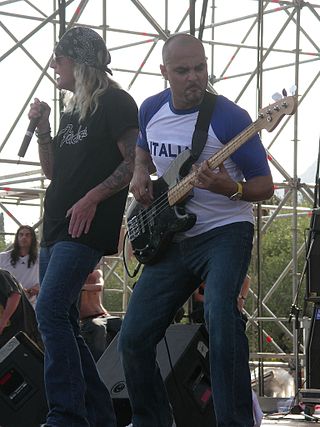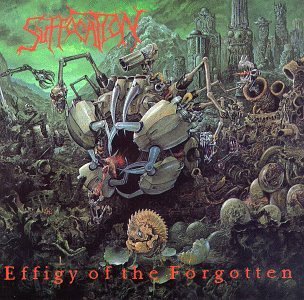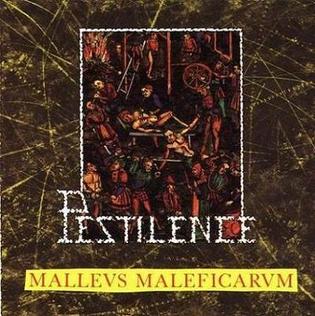Death metal is an extreme subgenre of heavy metal music. It typically employs heavily distorted and low-tuned guitars, played with techniques such as palm muting and tremolo picking; deep growling vocals; aggressive, powerful drumming, featuring double kick and blast beat techniques; minor keys or atonality; abrupt tempo, key, and time signature changes; and chromatic chord progressions. The lyrical themes of death metal may include slasher film-style violence, political conflict, religion, nature, philosophy, true crime and science fiction.
Progressive metal is a broad fusion music genre melding heavy metal and progressive rock, combining the loud "aggression" and amplified guitar-driven sound of the former with the more experimental, cerebral or quasi-classical compositions of the latter.
Melodic death metal is a subgenre of death metal that employs highly melodic guitar riffs, often borrowing from traditional heavy metal. The genre features the heaviness of death metal but with highly melodic or harmonized guitar riffs and solos, and often features high-pitched shrieked vocals alongside the low-pitched growls commonly featured in traditional death metal. Pioneered by the English heavy metal band Carcass with their 1993 album Heartwork, melodic death metal developed further in Sweden in the mid-1990s. The Swedish death metal scene did much to popularise the style, soon centering in the "Gothenburg metal" scene. At the Gates' Slaughter of the Soul, Dark Tranquillity's The Gallery, and In Flames' The Jester Race, all released in the mid-1990s, were highly influential albums in melodic death metal, with At the Gates and In Flames being the two most common influences on North American 2000s heavy metal bands. Many American heavy metal bands emulated At the Gates' sound, resulting in the usage of the phrase "At the Gates worship".

Pestilence is a Dutch death metal band founded in Enschede in 1986. They have been through various membership changes throughout their existence, with guitarist-vocalist Patrick Mameli as the sole constant member. After disbanding in order to pursue other musical directions in 1994, Pestilence reunited in 2008, and was put on a "permanent hold" in July 2014. However, the band reunited once again in October 2016. To date, Pestilence has released ten studio albums, and they are one of "progressive death metal's Big Four", along with Death, Atheist, and Cynic.

Martin van Drunen is a Dutch death metal vocalist who started out in the band Pestilence. In this band, he also performed the bass duties live. He recorded two albums with them, Malleus Maleficarum and Consuming Impulse. After his departure from Pestilence, van Drunen joined Asphyx as the singer and bass player in 1990 and recorded six studio albums in total. He performed the vocals on Comecon's second album Converging Conspiracies in 1993 and then formed his own band called Submission. In 1995, he was asked to replace Karl Willetts in the UK death metal band Bolt Thrower. He did two tours with them, but never recorded an album.

Tony Choy is a Cuban-American electric bassist. He was a session musician for some well-known technical death metal bands such as Atheist, Cynic and the Dutch band Pestilence. He is known for his use of the Slap & Pop playing technique, along with two-handed tapping.
Technical death metal is a musical subgenre of death metal with particular focus on instrumental skill and complex songwriting. Technical and progressive experimentation in death metal began in the late 1980s and early 1990s, largely driven by four bands that, according to Allmusic, are "technical death metal's Big Four" – Death, Pestilence, Atheist, and Cynic. All but Pestilence are part of the Florida death metal scene, to which Nocturnus, another influential band, also belongs.

Legion is the second album by Florida death metal band Deicide. It was released by Roadrunner Records on June 9, 1992.

Effigy of the Forgotten is the debut full-length album by New York–based death metal band Suffocation, released in 1991. The album features several tracks that are re-recorded versions of tracks that appeared on the band's Reincremation demo and Human Waste EP. The cover artwork was created by Dan Seagrave.

Malleus Maleficarum is the debut studio album by the Dutch death metal band Pestilence, released in 1988. Although the sound of this album is technically death metal, its direction is notably different from the band's subsequent work, leaning more towards the thrash metal genre with punk influences, known as crossover thrash. This is the only Pestilence album to include guitarist Randy Meinhard, who was replaced by Patrick Uterwijk prior to the making of their next album Consuming Impulse (1989).

Consuming Impulse is the second album by Dutch death metal band Pestilence, released in 1989. While retaining some of the thrash metal elements from its predecessor Malleus Maleficarum (1988), Consuming Impulse saw the band progress further towards the traditional death metal genre with progressive influences; this can be seen as one of the earliest examples of technical death metal, a subgenre that would be used and expanded on Pestilence's subsequent albums. Consuming Impulse was also their first release with then-new guitarist Patrick Uterwijk, and their last one to feature bassist and vocalist Martin van Drunen.

Spheres is the fourth album by Dutch death metal band Pestilence, released in 1993. It was their final album before a 14-year hiatus from 1994 to 2008. On this album, the band experimented with a more progressive sound, utilizing guitar synthesizers as well as some jazz influences.
Creepmime were a Dutch death metal band active from 1991 to 1997, and recorded two full-length albums, both on Mascot Records.

Cynic is an American progressive metal band formed in Miami, Florida in 1987. The band has been primarily based in California since the late 1990s, marking a significant shift in their geographic and creative roots. Paul Masvidal originally served solely as the band's guitarist, but later took over as lead vocalist and chief songwriter. Cynic incorporates elements of progressive rock, alternative, and metal.

Resurrection Macabre is the fifth studio album by Dutch death metal band Pestilence, which was released on 16 March 2009. It is the band's first album of original material in 16 years, since 1993's Spheres and this fact is referenced in the album's title; hence resurrection. Re-recordings of earlier Pestilence songs make appearances as bonus tracks on the record.

Secrets is the sixth studio album by guitarist Allan Holdsworth, released on 6 November 1989 through Intima Records; a remastered edition was reissued in 2008 through Eidolon Efformation. The album features drummer Vinnie Colaiuta, rather than regular collaborator Chad Wackerman; Wackerman did, however, write and perform drums on the song "Peril Premonition".

Patrizio Marco Giovanni "Patrick" Mameli is a Dutch musician who is the founder, lead singer, guitarist and only original remaining member of the technical death metal band Pestilence, which he formed in 1986. Mameli remains the creative force behind Pestilence, as well as the primary songwriter.

Doctrine is the sixth studio album by Dutch death metal band Pestilence, which was released on April 24, 2011. The album was recorded and mixed at Woodshed Studio in southern Germany with engineer Victor "V.Santura" Bullok. The artwork was designed by Marko Saarelainen. The album represents a second release by the reformed Pestilence, with two new members: Yuma van Eekelen and Jeroen Paul Thesseling, who was a member of the band during the Spheres era. Technically, the album is an experimentation with very low tunings, with Mameli and Uterwijk playing on 8-string guitars with standard tuning, and Thesseling playing a 7-string fretless bass tuned in F#.

Obsideo is the seventh studio album by Dutch death metal band Pestilence. It was released on October 21, 2013 via Candlelight Records. The album was produced by the vocalist/guitarist Patrick Mameli, and their last before their two-year hiatus from 2014 to 2016. According to Mameli, the album's overall lyrical theme is "the journey of the human soul." This is the final Pestilence album to feature lead and rhythm guitarist Patrick Uterwijk, who had been with the band since Consuming Impulse in 1989.

Hadeon is the eighth studio album by Dutch death metal band Pestilence. It was released digitally on 26 January 2018, nearly two months ahead of its scheduled release date; a physical component of the album was released on 9 March 2018. Hadeon is the band's first album since their two-year hiatus from 2014 to 2016, and the first one since Malleus Maleficarum (1988) not to feature longtime lead and rhythm guitarist Patrick Uterwijk.















